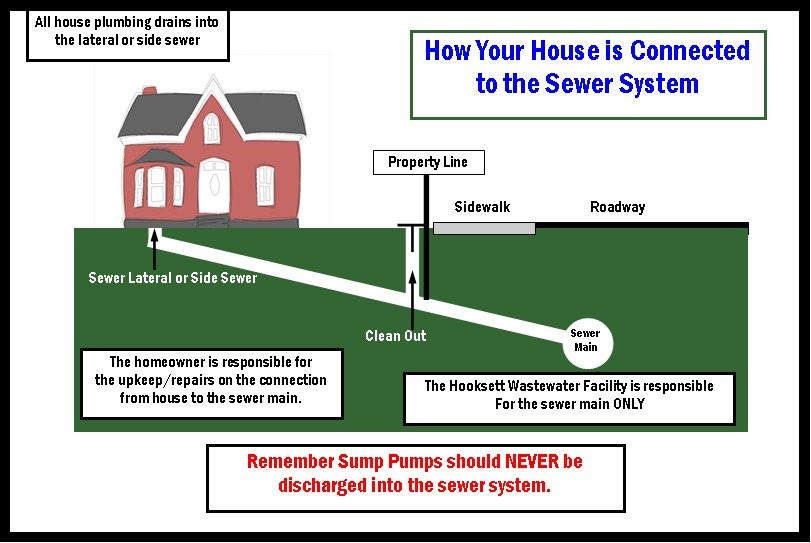Quick FAQs
Please remember that maintenance of internal plumbing and sewer service lines to the sewer main, not the Sewer Department’s.

What Should I do if I have a back up in my system?
Call the office at 485-7000 and ask for someone to come check your property. If the problem is not with the sewer main, than you should call a plumber. If the plumber cannot find the problem, have him or her call our office and speak to the Superintendent.
Is the Sewer Department responsible for storm drains?
No, storm drains are completely separate from Sewer lines. Any problems you see with them (blocked, overrunning, etc) should be called in directly to the Highway Department at 668-8019.
Should we contact the Sewer Department if we plan to dig on our property?
Definitely! You should always call and ensure that you will not be digging into your sewer line. If needed, someone will come out and mark where the line is to ensure no added expense is added to your project!
Can I empty my RV holding tank at the Wastewater Plant?
**Until Further Notice Hooksett Residents WILL NOT be able to dump at the plant.
What can I do with leftover chemicals/pesticides/paint?
Contact the Town Landfill at 669-5198
Who do I report illegal discharges to?
Call the Wastewater Plant at 485-7000 or 485-4112.
WHAT NOT TO FLUSH!
Download a Quick Reference Guide on What Not To Flush to print out and save!
- Diapers (baby AND adult) should NEVER be flushed down the toilet.
- Baby wipes, dust wipes, and disposable mop heads (i.e. swiffer) should also not be flushed.
- Anything that says “flushable” ISN’T!!!
- Adult products such as sanitary napkins, tampons, condoms, etc.
- Never pour grease down sink drains or into toilets! Over time, the grease can build up and block the entire pipe. Pour grease into a can (an empty coffee can works great). Keep it in the refrigerator so the grease can solidify and then dispose of it in the trash.
- Never use your garbage disposal in your sink as a substitute for the trash can. Scrape grease and food scraps from trays, plates, pots, pans, utensils, grills and cooking surfaces into a can or the trash for disposal. Be especially careful with pasta, potatoes, and other starchy foods. Starch and water make paste, which can plug pipes.
- Never dump kitty litter down the drain! Many of these products contain clay which will narrow the opening of your sewer pipe. Eventually it may plug your sewer pipe.
- Believe it or not, some facial cleaning scrubs have PLASTIC scrubbing beads that do not dissolve and end up in the sewer system. Check ingredients!!!!
- Use sewer pipe cleaning chemicals carefully and sparingly! Follow label instructions closely to avoid dangerous fumes, skin and eye injury, and pipe and fixture damage. Proper care of your home sewer pipes will decrease the need for chemicals. Fats, Oils, and Grease aren’t just bad for your arteries and your waistline; they’re bad for sewers too.
I have expired/unused medicine, should I flush it?
There have been more and more problems with excess medications being introduced into the wastewater systems which affects the treated water after it leaves the plant. DO NOT dispose of medications by flushing them down the toilet. Some medications and personal care products contain hazardous chemicals or even heavy metals, such as mercury which is used as a preservative. In New Hampshire, there has been increasing attention on mercury as a serious pollutant due to its toxic, persistent and bioaccumulative properties.
With the absence of guidance, one must use personal judgment to decide proper disposal. Here are some options to help you choose how to dispose of pharmaceutical and personal care products.
- Contact your local household hazardous waste coordinator prior to a collection event to determine if your municipality will accept the waste. Most collection events will accept mercury-added or other personal care products, but not pharmaceutical waste.
- Dispose of the waste in household trash.
a. Keep products in their original containers. Pharmaceutical container caps are typically watertight and child proof.
b. Add a small amount of water to a solid drug or some absorbent material such as kitty litter, sawdust or flour, to liquid drugs before recapping to discourage any unintended use of the drug.
c. Double seal the container in another container or heavy bag to prevent easy identification of the drug container or to prevent a glass container from breaking.
(obtained from NH DES WEBSITE)
